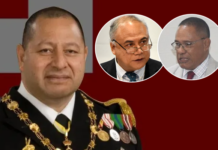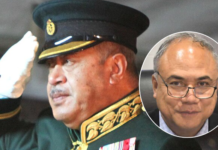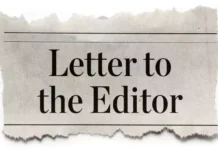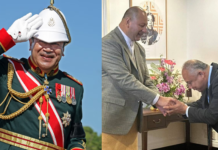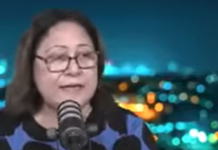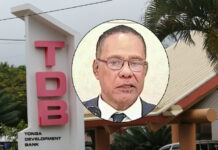Commentary: Prime Minister Pōhiva Tu’i’onetoa has accused Kaniva News of spin over the government’s quarry contract agreement.
Hon. Tu’i’onetoa did not deny the relationship between the government and the contractors we reported. He also spun his statement to make his readers think Kaniva had released misleading and incomplete information.
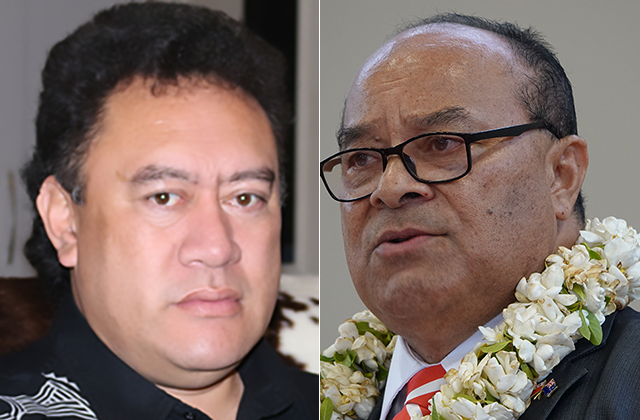
“I wish to clarify the government’s decision was not based on blood relationship ground and closed working ties as what the news was trying to put a spin on “na’e hehema ki ai e fakamatala ko eni”,” the Prime Minister said in a press statement in Tongan.
“The government wishes to say it’s important to release news which is truthful and fair for the people of the country and to stop releasing news that was incomplete and misleading.”
The Prime Minister should think twice before completely rejecting criticisms from the public about what they see as a conflict of interest in the way his government offered the quarry contract agreements to companies which have strong family connections.
READ MORE:
- Companies with strong government, family, connections awarded road building contracts
- PM says savings on price for road materials more important than government relationship with quarry contractors
- Pm’s Tt7 meeting: Road repairs, water supplies and assistances for growers were urgent needs
- PM’s Niuatoputapu Meeting: roading, wharf upgrade, drinking water residents’ top priorities
- PM’s Media Questions: Road Construction Project funding sources; debate on claims PM was a traitor; Vava’u visit and dialysis facility
He should be aware that in New Zealand, Australia and the USA conflict of interest is a big issue when it comes to government or private company procurements.
This means conflict of interest is a matter of interest for Tongans who are now living in New Zealand, Australia and the United States where the Tongan population is bigger than in the kingdom.
These people have criticised Hon. Tu’i’onetoa’s road project on social media. They have the right to do so because these are the people who send millions of pa’anga in remittances to Tonga every year and upon which the country’s economy relies.
In these countries, conflict of interest is not treated lightly, unlike the situation in Tonga where a clear conflict of interest is being treated as if it is unimportant.
Whenever a contract for advertising to run on Kaniva News from the New Zealand government is being prepared, the government agency wants to know whether there is any conflict of interest. A maintenance supply form was sent to Kaniva News asking whether the supplier was aware of any conflict of interest that may exist between the supplier and the government agency in relation to existing or future transactions?
In his attempts to justify the family and government connection with the quarry contractors, the Prime Minister said no law had been breached.
He gave two examples to justify his actions. He said he was a Professional Auditor (Chartered Accountant) who worked as Auditor General for so many years. He said the code of ethics for Chartered Accountants allowed the accounting firm to perform the auditing work and provide the accounting services for the same business and that was conflict of interest in which in his own interpretation it was legal in Tonga.
In most countries high standards are expected of public servants, government ministers, MPs and professionals.
In New Zealand there have been cases of lawyers and accountant companies being fined for breaching conflict of interest. “A Wanaka accountant has been ordered to pay more than $26,000 after he was appointed receiver of a failed winemaker despite an obvious conflict of interest.”
The New Zealand Public Service says: “The strength of any government system lies in the extent to which it earns and holds the respect of its citizens. That respect comes from the confidence which people have in the integrity of government and the services it provides.
“New Zealanders are entitled to the high expectations they have of the staff in government agencies. They expect that we are honest, fair, and loyal. These are absolute standards.
“New Zealanders expect departments to comply with both the letter and the spirit of the law. They expect official decisions to be made fairly and impartially. They expect that public money will be spent wisely and public assets will be used and cared for responsibly.
“Any abuse of trust, abuse of resources, abuse of information, or personal opportunism corrodes the entitlement of all New Zealanders.”
The Australian Public service says: “The public is entitled to have confidence in the integrity of their public officials, and to know that an employee’s personal interests do not conflict with his or her public duties.”
Government officials, whether elected or appointed, are held to very high standards in many countries. In South Australia, for instance, government ministers are expected to not only follow a ministerial code of conduct, but to ensure that they always appear to be doing so. In this way there can be no suspicion of ministers behaving improperly.
In some countries members of the government, whether elected or appointed, are expected to resign where conflicts of interest are serious enough. President Nixon was forced to resign in 1974 in the face of the Watergate investigation.
In July this year Tunisian Prime Minister Elyes Fakhfakh resigned amid suspicions of conflict of interest because of his stake in a waste processing company that won government contracts worth €15 million (NZ$26 million.)
Nobody is suggesting that Hon. Tu’i’onetoa should resign, but he should stop trying so hard to downplay people’s concerns. There is no doubt most Tongans want the road project and see it as a priority. However, they are deeply concerned about the background of the people who have strong links with government and these contractors.
There have also been concerns about the independence of the Procurement Committee because it was a government committee.
The government must listen to these concerns.

